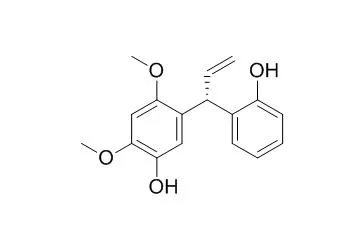In Korea and China, the heartwood of Dalbergia odorifera T. Chen is an important traditional medicine used to treat blood disorders, ischemia, swelling, and epigastric pain.
METHODS AND RESULTS:
In this study, we investigated the inhibitory effects of Latifolin, a major neoflavonoid component isolated from the MeOH extract of D. odorifera, on the inflammatory reaction of thioglycollate-elicited peritoneal macrophages exposed to lipopolysaccharide, with a particular focus on heme oxygenase-1 (HO-1) expression and nuclear factor-κB (NF-κB) signaling. Latifolin significantly inhibited the protein and mRNA expression of inducible nitric oxide synthase and COX-2, reduced NO, prostaglandins E2, tumor necrosis factor-α, and interleukin-1β production in primary murine peritoneal macrophages exposed to lipopolysaccharide. Latifolin also suppressed inhibitor κB-α levels, NF-κB nuclear translocation, and NF-κB DNA-binding activity. Furthermore, Latifolin upregulated HO-1 expression via nuclear transcription factor-E2-related factor 2 (Nrf2) nuclear translocation. In addition, using inhibitor tin protoporphyrin IX (SnPP), an inhibitor of HO-1, it was verified that the inhibitory effects of Latifolin on the proinflammatory mediators and NF-κB DNA-binding activity were associated with the HO-1 expression.
CONCLUSIONS:
These results suggested that the Latifolin-mediated up-regulation of HO-1 expression played a critical role in anti-inflammatory effects in macrophages. This study therefore identified potent therapeutic effects of Latifolin, which warrants further investigation as a potential treatment for inflammatory diseases. |






 Cell. 2018 Jan 11;172(1-2):249-261.e12. doi: 10.1016/j.cell.2017.12.019.IF=36.216(2019)
Cell. 2018 Jan 11;172(1-2):249-261.e12. doi: 10.1016/j.cell.2017.12.019.IF=36.216(2019) Cell Metab. 2020 Mar 3;31(3):534-548.e5. doi: 10.1016/j.cmet.2020.01.002.IF=22.415(2019)
Cell Metab. 2020 Mar 3;31(3):534-548.e5. doi: 10.1016/j.cmet.2020.01.002.IF=22.415(2019) Mol Cell. 2017 Nov 16;68(4):673-685.e6. doi: 10.1016/j.molcel.2017.10.022.IF=14.548(2019)
Mol Cell. 2017 Nov 16;68(4):673-685.e6. doi: 10.1016/j.molcel.2017.10.022.IF=14.548(2019)